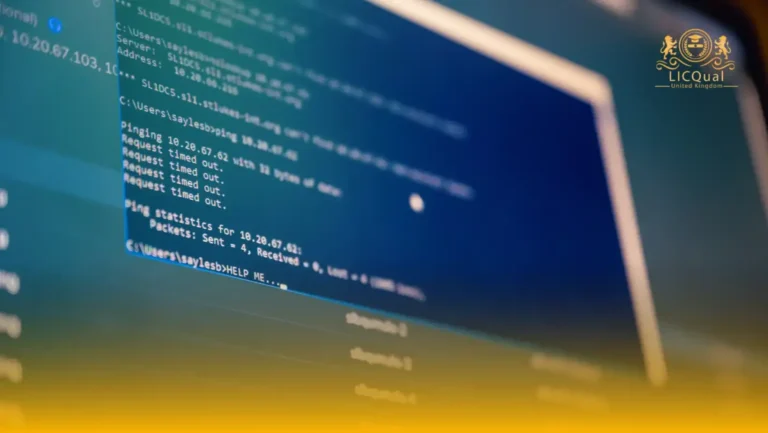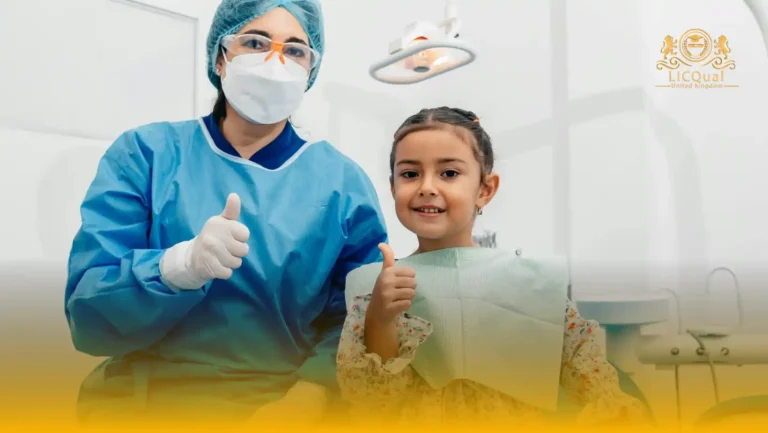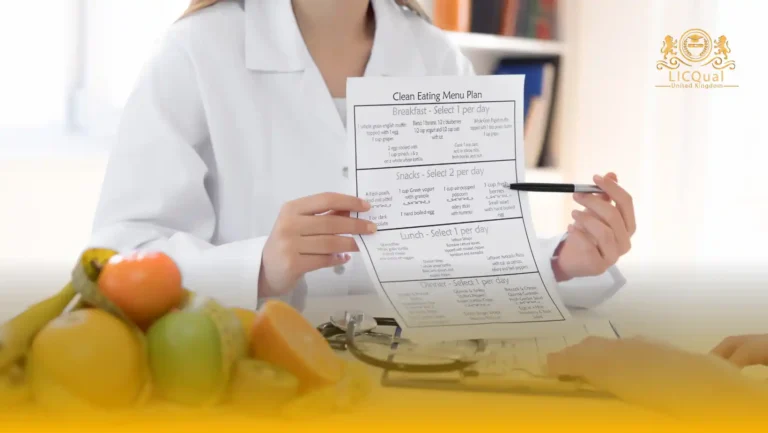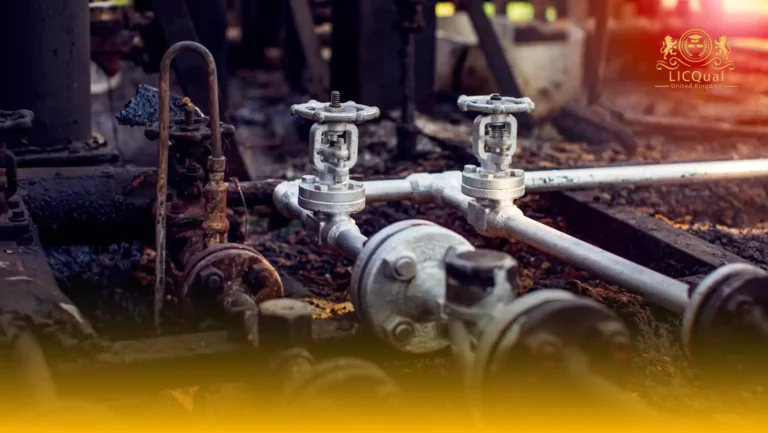The LICQual Level 3 Diploma in Pediatric Dentistry is a specialised qualification designed for dental professionals who wish to enhance their expertise in providing oral healthcare to children. This diploma is not intended for beginners but is tailored for experienced practitioners seeking to advance their career prospects, broaden their clinical knowledge, and meet their Continuing Professional Development (CPD) requirements.
Learners undertaking this qualification will gain a thorough understanding of child dental development, preventive care, and management of common paediatric dental conditions. The programme combines theoretical knowledge with practical application, enabling learners to deliver safe, effective, and child-friendly dental treatments.
Centres delivering the LICQual Level 3 Diploma in Pediatric Dentistry must maintain the highest standards of training. This includes employing competent and qualified staff, providing access to up-to-date paediatric dental materials and equipment, and maintaining facilities that support both theoretical learning and hands-on clinical practice. By ensuring these standards, centres help learners achieve their full potential and succeed in paediatric dentistry.
Upon successful completion, learners will be equipped to demonstrate professional excellence in child dental care, manage paediatric cases effectively, and enhance their clinical capabilities. This qualification is ideal for dentists, dental practitioners, and allied dental professionals committed to improving oral health outcomes for children while advancing their own professional expertise.
Course Overview
Qualification Title
LICQual Level 3 Diploma in Pediatric Dentistry
Total Units
6
Total Credits
60
GLH
240
Qualification #
LICQ2200657
Qualification Specification
To enroll in the LICQual Level 3 Diploma in Pediatric Dentistry, applicants must meet the following criteria:
|
Qualification# |
Unit Title |
Credits |
GLH |
|---|---|---|---|
|
LICQ2200657-1 |
Principles of Pediatric Dentistry |
10 |
40 |
|
LICQ2200657-2 |
Diagnosis and Treatment Planning for Children |
10 |
40 |
|
LICQ2200657-3 |
Preventive Pediatric Dentistry |
10 |
40 |
|
LICQ2200657-4 |
Restorative Pediatric Dentistry |
10 |
40 |
|
LICQ2200657-5 |
Management of Dental Behaviour and Anxiety |
10 |
40 |
|
LICQ2200657-6 |
Clinical Case Management and Child Patient Care |
10 |
40 |
By the end of this course, learners will be able to:
Unit 1: Principles of Pediatric Dentistry
By the end of this unit, learners will be able to:
- Explain the fundamental principles and concepts of paediatric dentistry.
- Describe the stages of child dental development and their clinical significance.
- Understand common paediatric dental conditions and oral health needs.
- Apply paediatric dental terminology in clinical practice.
Unit 2: Diagnosis and Treatment Planning for Children
By the end of this unit, learners will be able to:
- Assess paediatric patients effectively using clinical and diagnostic techniques.
- Interpret radiographs and other diagnostic tools in children.
- Develop comprehensive, evidence-based treatment plans tailored for paediatric patients.
- Communicate treatment options and recommendations clearly to children and their caregivers.
Unit 3: Preventive Pediatric Dentistry
By the end of this unit, learners will be able to:
- Apply preventive care strategies, including fluoride therapy and dietary advice.
- Educate children and caregivers on oral hygiene practices.
- Implement early intervention techniques to prevent dental disease.
- Evaluate the effectiveness of preventive measures in paediatric patients.
Unit 4: Restorative Pediatric Dentistry
By the end of this unit, learners will be able to:
- Perform restorative procedures suitable for children, including cavity preparation and fillings.
- Select appropriate restorative materials based on clinical requirements.
- Manage restorative treatments safely and effectively in paediatric patients.
- Assess and evaluate the success of restorative procedures.
Unit 5: Management of Dental Behaviour and Anxiety
By the end of this unit, learners will be able to:
- Identify factors influencing child behaviour and anxiety during dental treatment.
- Apply behaviour management and communication strategies effectively.
- Create a child-friendly clinical environment to enhance cooperation.
- Manage challenging behaviours professionally and ethically.
Unit 6: Clinical Case Management and Child Patient Care
By the end of this unit, learners will be able to:
- Integrate theoretical knowledge with practical skills to manage paediatric cases.
- Deliver safe, effective, and child-centred dental care.
- Evaluate treatment outcomes and make appropriate adjustments.
- Demonstrate professional communication with children, caregivers, and dental teams.
The LICQual Level 3 Diploma in Pediatric Dentistry is designed for dental professionals who want to specialize in child dental care, improve patient outcomes, and gain internationally recognized certification. This course is ideal for dentists, pediatric specialists, and allied dental professionals looking to enhance their clinical skills and confidence in treating young patients.
1. General Dentists and Practitioners
- Dentists seeking to expand expertise in pediatric oral health.
- Professionals aiming to enhance preventive and restorative care for children.
- Clinicians looking for internationally recognized certification.
- Practitioners wanting to improve patient comfort and compliance.
- Dentists mastering evidence-based pediatric dental techniques.
2. Pediatric Dentists and Specialists
- Specialists managing complex pediatric dental cases.
- Professionals improving behavior management and sedation techniques.
- Clinicians focusing on early orthodontic assessment and treatment.
- Experts staying updated with modern pediatric dental practices.
- Pediatric dentists enhancing clinical confidence and outcomes.
3. Dental Hygienists and Assistants
- Hygienists assisting with preventive and restorative pediatric care.
- Assistants learning patient preparation and post-treatment management.
- Team members improving workflow in pediatric dental procedures.
- Staff ensuring child comfort and procedural safety.
- Professionals pursuing certification to boost career opportunities.
4. Dental Students and Graduates
- Recent graduates preparing for specialized pediatric dentistry careers.
- Students gaining hands-on experience in child dental care.
- Learners seeking internationally recognized credentials.
- Individuals building foundational skills in pediatric oral health.
- Aspiring professionals focused on comprehensive child patient care.
5. Academic and Research Professionals
- Educators incorporating pediatric dentistry into training programs.
- Researchers studying child oral health and treatment outcomes.
- Academics developing evidence-based protocols for pediatric care.
- Professionals conducting clinical studies on pediatric dental procedures.
- Instructors providing practical training for students in pediatric dentistry.
6. Multidisciplinary Dental Teams
- Medical and dental staff collaborating on pediatric cases.
- Professionals integrating preventive and restorative care strategies.
- Team members ensuring effective and safe treatment planning.
- Staff focusing on workflow efficiency and communication.
- Practitioners optimizing coordination for high-quality child dental care.
7. Career-Focused Dental Professionals
- Individuals seeking to enhance clinical and procedural skills.
- Professionals pursuing globally recognized pediatric dentistry certification.
- Dentists expanding practice offerings with advanced child dental care.
- Learners improving professional credibility and reputation.
- Dental professionals committed to excellence in pediatric oral health.
This course equips a broad range of dental professionals with advanced skills in pediatric dentistry, enabling them to provide exceptional care while advancing their careers.
To deliver the LICQual Level 3 Diploma in Pediatric Dentistry effectively, centres must meet the following requirements to ensure high-quality training and learner success:
- Qualified and Competent Staff: Centres must employ experienced dental educators and clinicians with recognised qualifications in paediatric dentistry or related dental fields. Staff should be skilled in both theoretical instruction and practical training.
- Adequate Facilities: Centres should provide suitable clinical environments, including treatment rooms and laboratories that meet health and safety standards for paediatric dental procedures.
- Access to Paediatric Dental Materials and Equipment: Centres must supply all necessary materials, instruments, and tools required for practical training, including restorative materials, fluoride delivery systems, and diagnostic instruments.
- Learning Resources: Centres should provide learners with up-to-date textbooks, digital resources, and reference materials to support both theoretical and practical learning.
- Health and Safety Compliance: Centres must comply with all relevant dental health and safety regulations, infection control standards, and professional guidelines.
- Assessment and Learner Support: Centres must have systems in place for continuous assessment, feedback, and guidance to support learners in achieving course outcomes successfully.
- Commitment to Quality: Centres should maintain high standards of teaching, monitoring, and quality assurance to provide an effective and professional learning experience.
Meeting these centre requirements ensures learners receive comprehensive, safe, and practical training, equipping them with the skills and confidence to excel in paediatric dentistry.
Assessment and Verification
All units within this qualification are subject to internal assessment by the approved centre and external verification by LICQual. The qualification follows a criterion-referenced assessment approach, ensuring that learners meet all specified learning outcomes.
To achieve a ‘Pass’ in any unit, learners must provide valid, sufficient, and authentic evidence demonstrating their attainment of all learning outcomes and compliance with the prescribed assessment criteria. The Assessor is responsible for evaluating the evidence and determining whether the learner has successfully met the required standards.
Assessors must maintain a clear and comprehensive audit trail, documenting the basis for their assessment decisions to ensure transparency, consistency, and compliance with quality assurance requirements.







